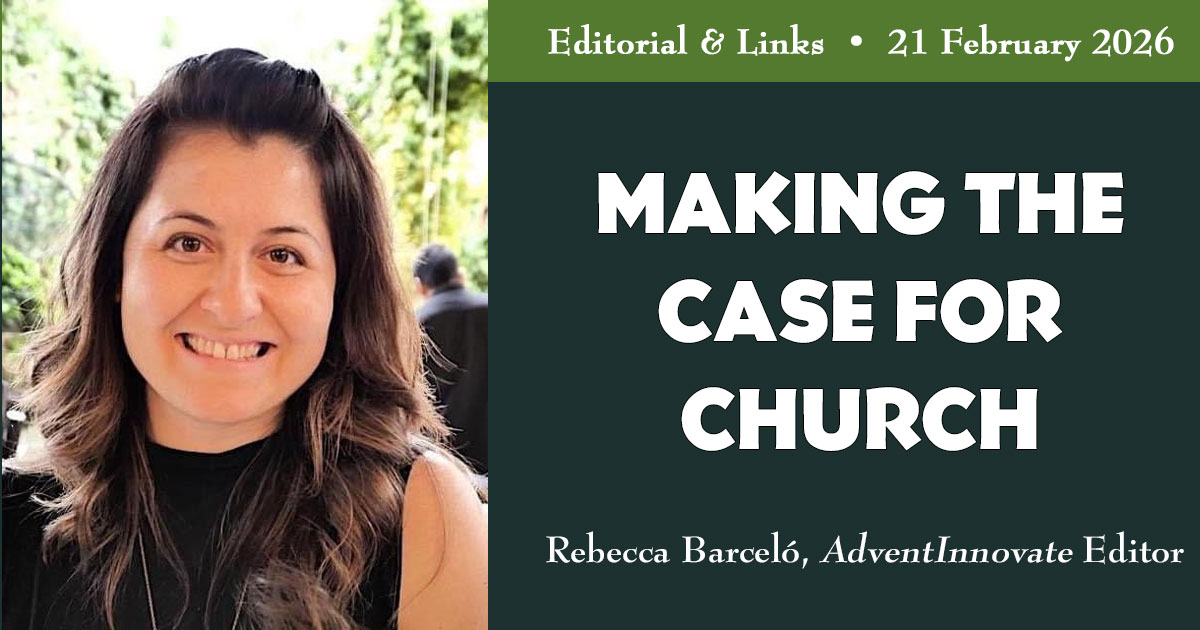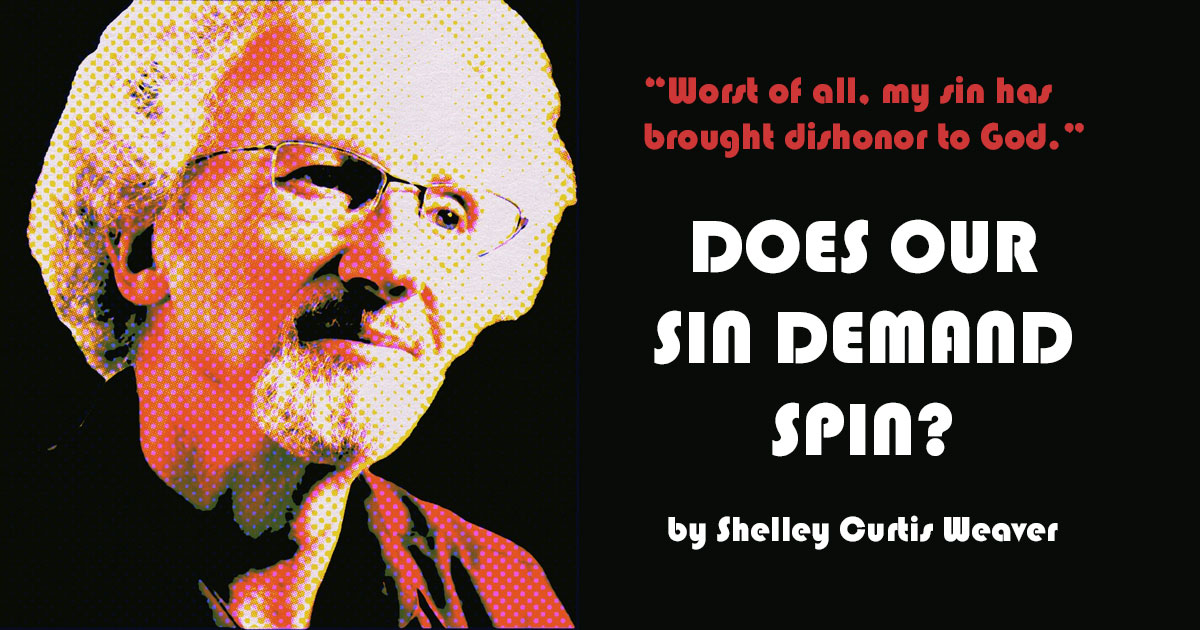Character of the 144, 000 – Part 2 — Pr. Michael Pedrin
Study: Lesson 8, The Preeminence of Christ — Mohan John THANK YOU for your continued financial support of our Media Ministries. Please donate by visiting "https://adventistgiving.org/#/org/ANB4RC/envelope/start" and select “Media Ministries”. Connect With Us
X: RemnantSDA
Facebook: RemnantSDAchurch.org
Instagram: RemnantSDAchurch Source: https://www.youtube.com/watch?v=X-VKTe2kyAQ
Have you ever pulled a wool sweater from storage, only to discover it full of tiny holes? #parable
EDITORIAL: The Case for Going to Church

In the wake of the 2020 pandemic, a profound sociological shift took place. Nearly everything migrated online. We shop online. We work online. We date online. We even “church” online. What began as a necessity has, in many contexts, become the norm. This shift has produced real benefits. For those with disabilities, chronic illness, caregiving […] Source: https://atoday.org/editorial-the-case-for-going-to-church/
Vespers | Feb 20, 2026 | If God is for Us, Who Can be Against Us
https://www.youtube.com/watch?v=paZslLDS2D4
If God is for Us, Who Can be Against Us — Lalitha Isaac THANK YOU for your continued financial support of our Media Ministries. Please donate by visiting "https://adventistgiving.org/#/org/ANB4RC/envelope/start" and select “Media Ministries”. Connect With Us
X: RemnantSDA
Facebook: RemnantSDAchurch.org
Instagram: RemnantSDAchurch Source: https://www.youtube.com/watch?v=paZslLDS2D4
God First: Your Daily Prayer Meeting #1284
Bible verse of the day: Psalm 116:1-2 – "I love the Lord, for he heard my voice; he heard my cry for mercy. Because he turned his ear to me, I will call on him as long as I live." Welcome to our Daily Prayer Meeting! This is a safe space where you are seen, heard, and prayed for. Start your day in God's presence—every day at 8AM ET, we share a short devotional from God's Word and lift your prayer requests to Him. You're not alone! Our prayer team is here to intercede with you and for you. Whether you need prayer, celebrate a breakthrough, or start your day with Jesus, you're in the right place. Share your prayer requests or testimonies of praise here: https://wkf.ms/3DBuapQ Engage with us in the comments:
• How can we pray for you today?
• Where are you watching from?
• What are you thankful for? How has God answered your prayers? Let’s grow together in faith, hope, and love—one prayer at a time. Don’t forget to subscribe and turn on notifications so you never miss a prayer. 🔔 Share this video with someone who needs hope or tag a loved one who needs encouragement today. Today’s Message: Pr Vinicius Miranda The Seventh-day Adventist Church has been an established denomination since 1863. It is a global Christian family with over 21 million members who hold the Bible as the ultimate authority. We are believers committed to helping people understand the Bible to find freedom, healing, and hope in Jesus. Want to learn more about the Seventh-day Adventist Church? Visit our website at: https://www.adventist.org/ Find us on social media by following the links below:
Facebook:
https://www.facebook.com/theadventistchurch
Instagram:
https://www.instagram.com/adventistchurch
Twitter/X: https://twitter.com/adventistchurch 👉 Want more prayer moments?
Watch our full playlist of daily prayer videos here: https://youtube.com/playlist?list=PL-k2Gb-DBYo–V8axD7iFUL6TFEckrhxv&si=vIljgfwrSZN6iJR2 God First, Daily Prayer, Prayer Meeting, Christian Prayer, Morning Devotional, Hope In Jesus, Bible Verse Of The Day, Prayer Request, Faith Community, Seventh Day Adventist Source: https://www.youtube.com/watch?v=GQcmGnDhe3Q
Impara ad amarti come Dio ti ama #drittoalcuore
Molti parlano di amore per il prossimo. Ma Gesù esorta: "Ama il prossimo tuo come te stesso". In questa meditazione scopriamo che accettare le proprie fragilità è il primo passo verso un amore che guarisce e si espande. 💡 Lascia che lo sguardo di Dio trasformi il tuo modo di vedere te stesso e gli altri. #Amore #Identità #Spiritualità #HopeMediaItalia #Gesù Source: https://www.youtube.com/shorts/z2sNiQocXLg
Are We God’s Publicists?

by Shelley Curtis Weaver | 20 February 2026 | We’re probably past critical mass for analyzing the public confession of Philip Yancey’s eight-year affair. The only discussion left unexamined is why it came to be public. When Christianity Today (CT) printed Yancey’s confession and resignation as a CT contributor, the piece spilled past their usual […] Source: https://atoday.org/does-our-sin-demand-spin/
The Sabbath reveals how intentional God is.
The Sabbath reminds us that we serve a God who plans ahead. A God who provides before we realize what we need. A God who invites us to rest in what He has already finished. Take a moment today to reflect on that. We serve an intentional and loving God. Source: https://www.youtube.com/shorts/Hs9Klx6x7Xc
Sabbath: Reconciliation and Hope
Daily Lesson for Sabbath 21st of February 2026
Read for This Week’s Study
Colossians 1:20-29, Ephesians 5:27, Ephesians 3:17, Romans 8:18, Ephesians 1:7-10, Ephesians 3:3-6, Proverbs 14:12.
Memory Text: “For he hath made him to be sin for us, who knew no sin; that we might be made the righteousness of God in him” (2 Corinthians 5:21).
Paul continues the theme of reconciliation, which was so vividly highlighted in Colossians 1:20 (see Lesson 8, Thursday). There he described its cosmic scope, while what follows it becomes personal and individual. Through His death on the cross, Jesus has accomplished reconciliation for everyone and everything, especially human beings, who were alienated from the life of God through sin, but now can be reconciled to Him through faith.
The process of individual reconciliation is unpacked in this week’s passage. As with the cosmic sphere, it happens through the death of Christ. On the individual level, the cross, far from being a passive symbol, becomes an active reality, with God’s love transforming people as they hear the gospel and receive Christ Himself, the hope of glory.
Paul also talks about “the mystery which has been hidden from ages and from generations” (Colossians 1:26, NKJV). What is this mystery, and what all does it envision—for the individual and for the universe? How does this “mystery” relate to the gospel that Paul has so passionately proclaimed?
*Study this week’s lesson to prepare for Sabbath, February 28.
Family: One Surname, Many Names – Pastor Erton Köhler
The Bible says, "For as the body is one and has many members, but all the members of that one body, being many, are one body, so also is Christ" (1 Corinthians 12:12). The same Spirit works through many expressions of faith, and the same Savior binds us in one purpose. From Tuxtla Gutiérrez, Mexico, where tens of thousands of new members were welcomed through months of prayer and Bible study, to South Africa's Limpopo Province, where solar-powered audio Bibles reached families in their own language. From Hong Kong, where twenty-five years of coordinated ministry continue, to Jamaica, where churches became relief hubs after Hurricane Melissa. From the Solomon Islands, where remote communities experienced renewed outreach. Different places, one family on mission. "There is one body and one Spirit, just as you were called in one hope of your calling" (Ephesians 4:4). In the body of Christ, every member matters. Every prayer, every act of service, every baptism, every word of kindness adds strength to the whole. The world is divided by borders and languages, but the Church is called to build bridges. We are one family with countless faces and one identity that never fades. About the series From the Heart is a weekly devotional series in which Pastor Köhler reflects on what it means to be grounded in the Bible and focused on the mission, collectively and individually. Each episode is grounded in the four pillars of the Seventh-day Adventist Church strategic plan: Communion with God, Identity in Christ, Unity through the Holy Spirit, and Mission for All. The series connects biblical faith to everyday life, sharing short reflections and glimpses of how God is at work through the Adventist Church around the world.
– The Seventh-day Adventist Church has been an established denomination since 1863. It is a global Christian family with over 23 million members who hold the Bible as the ultimate authority. We are believers committed to helping people understand the Bible to find freedom, healing, and hope in Jesus. Want to learn more about the Seventh-day Adventist Church? Visit our website at: https://www.adventist.org/ Source: https://www.youtube.com/watch?v=l6BrJUbn9nY
- « Previous Page
- 1
- …
- 7
- 8
- 9
- 10
- 11
- …
- 4852
- Next Page »


